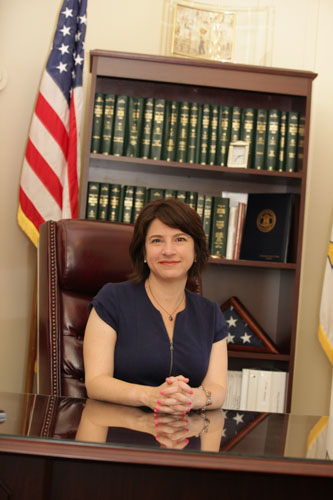Gayle Goldin is a Democratic State Senator in Rhode Island. Goldin has represented District 3 of Rhode Island since she was elected in 2013, an area that includes the East Side and Fox Point communities in Providence. Goldin currently serves as the Vice Chair of Senate Health and Human Services, and co-chairs the Rhode Island Democratic Women’s Caucus. As a part of the Senate, she has pushed for legislation on issues including paid family leave, voting rights, equal pay, and reproductive rights.
BPR: What is the state of reproductive rights in Rhode Island?
GG: Since 1986, the Rhode Island state constitution has said that women do not have the right to an abortion. The Democratic Party since then has put the protection of abortion and reproductive rights into its platform, but it has made no difference — a significant number of Democratic members of the Rhode Island General Assembly are still endorsed by Right to Life. There have been multiple laws passed since then that limit reproductive rights and have been struck down as unconstitutional in the state, because they are inconsistent with federal law — including, for instance, requiring that a woman who wants to have an abortion must notify her spouse. Even in 2013, the legislature passed (and then-Governor Chafee vetoed) a bill that would have created a “choose life” license plate where the funding would have funded the Knights of Columbus [a Catholic group which opposes abortion] and crisis pregnancy centers, which are fake medical centers that are completely unregulated, and are designed to prevent women from getting abortions.
BPR: What particular factors do you think help create this anti-abortion environment in Rhode Island?
GG: Rhode Island has the highest percentage of Catholic population, and the most Catholic legislature, in the country. The result of this is that the Catholic Church has tremendous influence in the state, even if Catholic Rhode Islanders do not necessarily agree – if you look at all of the polling on Catholic people’s views on reproductive rights, it differs strongly from what the Catholic Church says. Many people do not realize that the Catholic Church itself has a lobbyist in the state house, and that priest almost exclusively works to influence the Catholic members of the legislature to limit reproductive rights — as opposed to any of the number of things the the Catholic Church should be lobbying for. The Catholic Church also actively goes after Catholic legislators by taking out ads in newspapers, and putting things in their church bulletins – they basically take out these ads with legislators’ pictures on them and say: “these people are trying to kill your babies.” It is very aggressive and intentionally designed to intimidate legislators.
BPR: Can you speak about your experience introducing the Reproductive Health Care Act? How was it received by your fellow legislators?
GG: The speaker [Democrat Nicholas Mattiello] is quoted saying that women are taking up too much oxygen with this. I have had colleagues tell me not to worry about it – that when it really becomes a problem, they will take care of it. That’s really just a sexist way of saying: ‘you’re being hysterical,’ and ‘why are you worrying about something that doesn’t matter?’ Frankly, the majority leader [Joseph] Shekarchi essentially said that in front of a group of Democratic women. Women’s concerns about our current president, and his attacks on women and women’s reproductive rights, have been dismissed as something that needs to wait until some dramatic thing happens – but those things have already happened.
BPR: Do you think there is space in the Democratic Party for people who are anti-abortion?
GG: The way I look at it is that I believe a fundamental tenet of the Democratic Party is the way we treat other people with dignity, and understand that there are consequences to not doing so. I believe that all Democrats should be able to at least say, even if they think that abortion is a decision they would never make for themselves, that they can recognize that people have the right to their own privacy and the right to make decisions about their own body.
